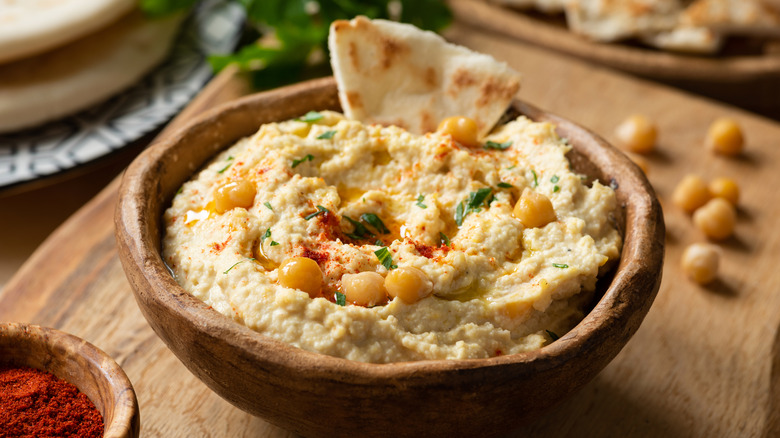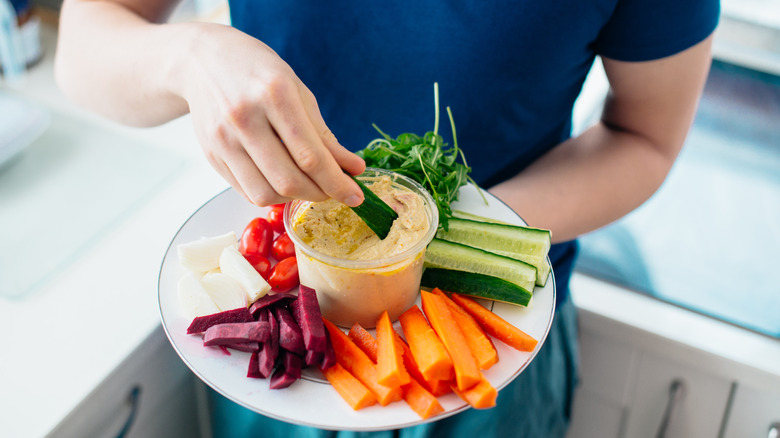Eat This Unexpected Snack Before Bed To Fall Asleep In Record Time
The effects of not getting consistent quality sleep can really show on your face. It's one of the reasons why you're met with the polite and concerned, "You look so tired" comments from people that drive you up the wall. Enraging as those remarks are, there's truth in them. Not getting your recommended hours of snooze time at night (7-9 hours for adults) can do a lot more than affect your skin color and vitality. It can wreak havoc on your energy levels, immune system, mood, and overall health.
This is why those wakeful nights of staring at the ceiling are so frustrating. You're up trying to think of what could be ruining your sleep while the clock slowly ticks away toward dawn. If only there were a snack lurking in your fridge that can put you to bed in record time. Well, turns out, there just might be.
Got any leftover hummus from the day before? Try eating some of that to help you get to sleep, say the experts. Made using cooked chickpeas (also known as garbanzo beans), some tahini, lemon juice, and a dash of olive oil, the real star in this dish when it comes to sleep-friendly ingredients is the chickpeas.
What do chickpeas contain that help you sleep?
Assumed to have originated from the Turkish region neighboring Syria, chickpeas are packed full of a lot of helpful nutrients, including fiber, protein, healthy fat, manganese, folate, copper, iron, zinc, magnesium, thiamine, vitamin B6, selenium, and potassium.
They're also a good source of tryptophan, according to registered dietician Amy Beney (via Sleepopolis). "Tryptophan is an essential amino acid. It also helps make serotonin which is a feel-good body chemical, and melatonin, which can help with sleep," explained the expert. The vitamin B6 in this legume can also boost serotonin levels.
Additionally, the protein, fiber, and healthy fat content in chickpeas can help promote feelings of fullness, preventing nighttime hunger. They are also a fairly low glycemic index (GI) food, which means they won't cause rapid spikes in blood sugar levels when you consume them. This blood sugar-regulating benefit of chickpeas can be conducive to better sleep too. The magnesium found in chickpeas could promote sleep by reducing your levels of the stress hormone cortisol, boosting melatonin, enhancing muscle relaxation, and regulating the neurotransmitter gamma-aminobutyric acid (GABA) which is involved in calming the nervous system.
As for hummus as a whole, there's another reason you should add it to your list of foods that can help you sleep — the other ingredients. Lemon water is associated with relaxing properties because of its hydrating vitamin C content and tahini paste (made from tryptophan-rich sesame seeds) also helps induce sleep.
How to consume hummus before bedtime
While there are some foods you should never eat before bed, it is generally recommended that you don't eat snacks — even hummus and other healthy snacks — too close to bedtime. Two hours before getting under the covers to doze off is a good practice to follow. Pairing the hummus with healthy yet refreshing accompaniments like sliced cucumbers, carrots, or bell peppers might be even more helpful.
Making hummus at home means that you have better control of the ingredients. Throw in some drained and rinsed canned chickpeas, lemon juice, olive oil, tahini paste, some water, and if you like, some garlic too, and blend the stuff in a food processor until you get the texture that you like. If you're buying your hummus from the store, read the ingredient list to check for added sugar, sodium, and unhealthy oil content.
Portion size matters as well. Hummus does contain several calories, mainly owing to its oil and tahini content, so try not to consume too much of it in one sitting.
Beyond its sleep-friendly benefits, hummus is associated with preventing heart disease (thanks to its soluble fiber content), improving gut health, and fighting inflammation and chronic diseases like cancer (owing to its antioxidants). It is also free of gluten, nuts, and dairy.



